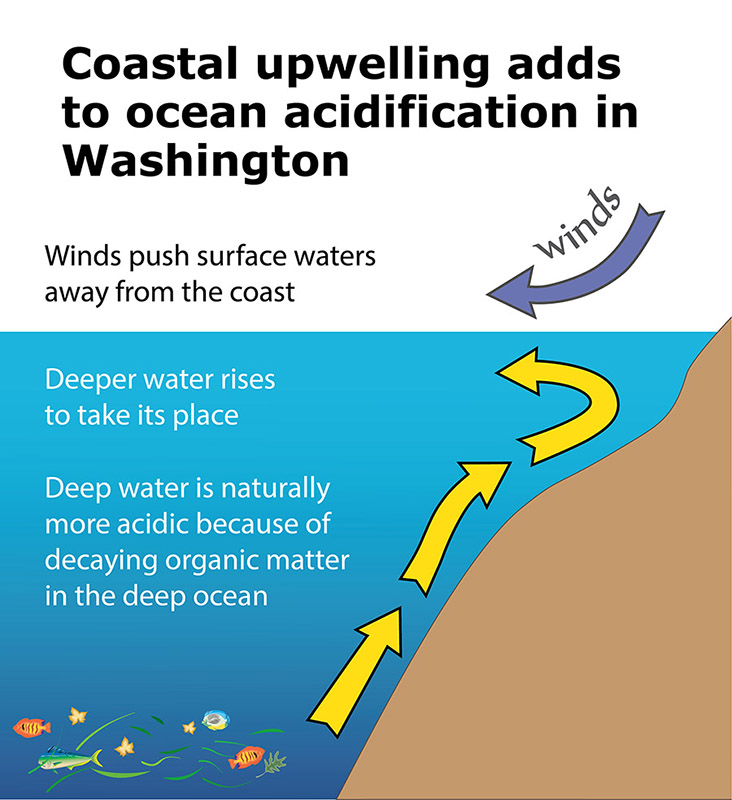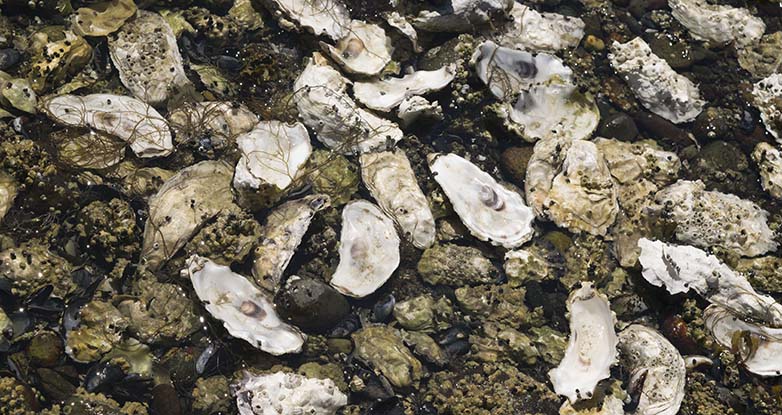Acidification in Puget Sound
Climate change and ocean acidification
Air & ClimateOcean acidification is a global problem that has local effects on the Puget Sound ecosystem. It threatens Washington's marine wildlife and economy. We are working to determine the causes and impacts of ocean acidification and to identify possible solutions.
We support continued research and monitoring to provide the critical information needed to make decisions about ocean acidification. We are investing in science and working in partnership with scientists, policymakers, and industry experts to prepare Washington for ocean acidification and other adverse effects from a changing climate.
Seawater chemistry is changing with rise in CO2
Ocean acidification is the scientific term used to describe how seawater chemistry is changing due to increased amounts of carbon dioxide (CO2) in the ocean from human activities, such as deforestation and combustion of fossil fuels. Since the Industrial Revolution, CO2 continues to increase in the atmosphere, some of which is absorbed by the ocean. This extra CO2 has changed the chemistry of seawater, making it more acidic.
As seawater becomes acidic, it contains fewer carbonate ions that are available for marine organisms. This shift in chemistry affects marine organisms that need calcium carbonate to form skeletons and shells. Aquatic species respond in different degrees to the changing ocean chemistry. The changes in ocean chemistry affect the base of the marine food web and ultimately affect shellfish and fish populations, including those harvested by people for food.
A local problem
Locally, Puget Sound and marine waters just off the Washington coast are affected by global ocean acidification when deep ocean water upwells into the coastal zone and enters the Sound and coastal inlets. A number of local factors — including local carbon and nutrient pollution — can increase Puget Sound’s sensitivity to the effects of acidification.
Acidification has local effects on marine life in Puget Sound and coastal bays. In the summer, upwelled Pacific Ocean water flows inshore and increases acidification. Three factors in Washington compound the effects of global ocean acidification; one is caused by local weather, while the other two can be controlled:
- Coastal winds bring deep Pacific Ocean water to the surface in a process called upwelling. This deep, nutrient-rich water is naturally more acidic due to organic matter decomposing in the deep ocean.
- Nitrogen loading and organic-matter inputs from various local sources fuel algae growth. This decreases oxygen levels and increases CO2 levels in the water.
- Local industrial emissions of CO2 and other acidic gases can be absorbed by Puget Sound marine waters.
Local species are at risk
Washington has a vibrant commercial and recreational shellfish industry that has started to experience adverse effects from ocean acidification. This is expected to get worse over time.
Shellfish and other marine organisms in Puget Sound depend on dissolved calcium to build and maintain their shells and skeletons. These organisms include oysters, clams, mussels, barnacles, and plankton, which in turn are an important food source for salmon, seabirds, whales, and other marine wildlife. The availability of dissolved calcium thus affects the entire ecosystem, including humans.
Washington's commercial and recreational shellfish industry supports thousands of jobs and contributes tens of millions of dollars to the state’s economy. Acidification threatens the viability of these industries. In fact, the local oyster industry has been combating ocean acidification by adding sodium carbonate into hatchery waters. However, as carbonate levels continue to drop, this stop-gap solution will become less and less effective.
What we're doing in Washington
Along with other organizations and agencies in the state, we are expanding efforts to include monitoring of ocean acidification in local waters. We are also involved in a modeling study to understand more about the various processes and relative influences of acidification locally. These modeling tools will help guide management actions into the future.
Monitoring and modeling efforts
We continue to monitor marine waters and study Puget Sound to provide the information needed to make decisions about adapting to and minimizing the effects of ocean acidification. We have also developed the Salish Sea Model, a robust computer modeling tool that we are using to estimate the global and regional impact of ocean acidification for state waters. The model simulates environmental responses to increased CO2. We are also working in partnership with other west coast states and investing in science to evaluate policies intended to mitigate regional ocean acidification beyond Washington's marine waters.



